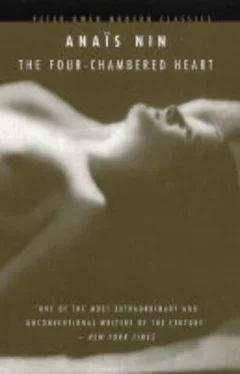Anaïs Nin - The Four-Chambered Heart
Здесь есть возможность читать онлайн «Anaïs Nin - The Four-Chambered Heart» весь текст электронной книги совершенно бесплатно (целиком полную версию без сокращений). В некоторых случаях можно слушать аудио, скачать через торрент в формате fb2 и присутствует краткое содержание. Год выпуска: 2004, ISBN: 2004, Издательство: Peter Owen Limited, Жанр: Классическая проза, Эротические любовные романы, на английском языке. Описание произведения, (предисловие) а так же отзывы посетителей доступны на портале библиотеки ЛибКат.
- Название:The Four-Chambered Heart
- Автор:
- Издательство:Peter Owen Limited
- Жанр:
- Год:2004
- ISBN:9780720611557
- Рейтинг книги:3 / 5. Голосов: 1
-
Избранное:Добавить в избранное
- Отзывы:
-
Ваша оценка:
- 60
- 1
- 2
- 3
- 4
- 5
The Four-Chambered Heart: краткое содержание, описание и аннотация
Предлагаем к чтению аннотацию, описание, краткое содержание или предисловие (зависит от того, что написал сам автор книги «The Four-Chambered Heart»). Если вы не нашли необходимую информацию о книге — напишите в комментариях, мы постараемся отыскать её.
The Four-Chambered Heart — читать онлайн бесплатно полную книгу (весь текст) целиком
Ниже представлен текст книги, разбитый по страницам. Система сохранения места последней прочитанной страницы, позволяет с удобством читать онлайн бесплатно книгу «The Four-Chambered Heart», без необходимости каждый раз заново искать на чём Вы остановились. Поставьте закладку, и сможете в любой момент перейти на страницу, на которой закончили чтение.
Интервал:
Закладка:
When you lose your wings, and wear a dark suit bought in the cheapest store of Paris, to become anonymous, when you discard your earrings, and the polish on your nails, hoping to express an abdication of the self, a devotion to impersonal service, and still you do not feel sincere, you feel like an actress, because you expect conversion to come like miracle, by the grace of love for one party member…
They know I am pretending.
That is how she interpreted the silence.
In her own eyes, she stood judged and condemned. She was the only woman there, and they knew she was there only because she was a woman, tangled in her love, not in the revolution.
Then Rango came, breathless, and anxious: “There will be no meeting. You are ordered to disperse. No explanations.”
They were relieved to go. They left in silence. They did not look at her.
Rango and Djuna were left alone.
Rango said: “ Your friend the policeman was on guard at the top of the stairs. A hobo had been found murdered. So when the Guatemalans began to arrive, he asked for papers. It was dangerous.” He had made his first error, in thinking the barge a good place. The head of the group had been severe. Had called him a romantic… “He also knows about you. Asked if you were a member. I had to tell the truth.”
“Should I sign the papers?” she asked, with a docility which was so much like a child’s that Rango was moved.
“If you do it for me, that’s bad. You have to do it for yourself.”
“Oh, for myself. You know what I believe. The world today is rootless; it’s like a forest with all the trees with their heads in the ground and their roots gesticulating wildly in the air, withering. The only remedy is to begin a world of two; in two there is hope of perfection, and that in turn may spread to all… But it must begin at the base, in relationship of man and woman.”
“I’m going to give you books to read, to study.”
Would his new philosophy change his overindulgence and slavishness to Zora, would he see her with new eyes, see the waste, the criminality of her self-absorption? Would he say to her, too: there are more important things in the world than your little pains. One must forget one’s personal life. Would his personal life be altered as she had not been able to alter it? Would his confusions and errors be clarified?
Djuna began to hope. She began to study. She noted analogies between the new philosophy and what she had been expounding uselessly to Rango.
For instance, to die romantically, recklessly, unintelligently, was not approved by the party. Waste. Confusion. Indiscipline. The party developed a kind of stoicism, an armature, a form of behavior and thinking.
Djuna gradually allied herself to the essence of the philosophy, to its results rather, and overlooked the rigid dogmas.
The essence was construcion. In a large way she could adopt this because it harmonized with her obsessional battle against destruction and negativism.
She was not alone against the demoralizing, dissolving influence of Zora.
Perhaps the trap was opening a little, in an unforeseen direction.
What he could not do for her (because she was his pleasure, his self-indulgence, his sensually fulfilling mistress, and this gave him guilt), he might do for the party and for a large, anonymous mass of people.
The trap was the fixation on the impossible. A change in Zora, instead of an aggravation. A change in Rango, instead of a gradual strangulation.
Passion alone had not made him whole. But it had made him whole enough to be useful to the world.
When the barge failed to become the meeting place for Rango’s fellow workers, it was suddenly transformed into its opposite: a shelter for the dreamers looking for a haven. The more bitter the atmosphere of Paris, the more intense the dissensions, the rising tide of political antagonisms, dangers, fears, the more they came to the barge as if it were Noah’s Ark against a new deluge.
It was no longer the secret boat of a voyage of two. The unicellular nights had come to an end. Rango was but a visitor-lover in transit.
The divergence between them became sharply exteriorized: while Rango attended meetings, talked feverishly in cafes, sought to convert, to teach, to organize, worked among the poor he had known, among the artists, Djuna’s friends brought to the barge the values they believed in danger of being lost, a passionate clinging to aesthetic and human creation.
Rango brought stories of cruelty and personal sacrifice: Ramon had been four years without seeing his wife and child. He had been working in Guatemala. Now his wife in Paris was gravely ill, and he wanted to throw off his duties there and come, at any cost. “Think of a man forgetting his loyalty to his party, just because his wife and child need him. Willing to sacrifice the good of millions, perhaps, for just two.”
“Rango, that’s just what you would do, and you know it. That’s what you have done with Zora. You’ve given twenty years of your strength to one human being, when you could have done greater things, too…”
Another day he came and was sick in her arms, vomited all night, and only at dawn, weak, and feverish did he confess: they had had to arrest a traitor. He had been a friend of Rango’s. The group had been obliged to judge him. Rango had been forced to question him. The man was not really a traitor. He was weak. He had needed money for his family. He was tired of working for the party without pay. The party never worried about a man’s family, what they needed while he was away on duty. He had given his whole life, and now, at forty, he had weakened. He had been tempted by a good position in the embassy. At first he had intended to exploit his position for the benefit of the party. But after awhile he got tired of danger. He had ceased to be of help… Rango had had to force himself to turn him over to the party. It had made him sick. It was his first cruel, difficult, disciplined act. But he didn’t sleep for a week, and each time he remembered the man’s face as he told his story, and repeated: just tired, very tired, worn out, at forty, too many times in prison, too many hardships, couldn’t take any more. Had been in the party from the age of seventeen, had been useful, courageous, but now he was tired.
Every day he brought a story like this one. When the conflict grew too great he drank. Djuna did not have this escape. When the stories burnt into her and hurt her, she turned away and into the dream again, as she had done in childhood. There was another world visible to practiced eyes, easy to enter and inhabit, another chamber to which only the initiate could follow.
(Moods flowing like the river finding its way to the sea and vastness and depth. In this world the river was the flow; tap the secret of its flow, in the lulling rhythm of its waves, in the continuity of its current. Love is a madness shared by two, love is the crystal in which people find their unity. In this world Rango was capable of giving himself to a dream of love, which is a city of only two inhabitants. In this world, when Rango buys shoes so heavy and so strong, they seem like the hooves of the centaur, hooves of iron, whose head was in the heavens but whose hooves must pound the battlefields.)
There are drugs to escape reality, a Rango vomiting from the spectacle of cruelty, Rango’s harshness toward her feelings. He should, by laws of accuracy, be angry at his own emotionalism and human fallibility. But because of his blindness, he gets angry at Djuna’s face turned away and attacks her swift departures from horror. He drinks but does not consider thata trap door opening on the infinite, an inferior drug to dispel pain… But Djuna’s excursions into astronomy, her sheltering of the artists in the barge… He is merciless toward their kind of drug to transform reality into something bearable…
Читать дальшеИнтервал:
Закладка:
Похожие книги на «The Four-Chambered Heart»
Представляем Вашему вниманию похожие книги на «The Four-Chambered Heart» списком для выбора. Мы отобрали схожую по названию и смыслу литературу в надежде предоставить читателям больше вариантов отыскать новые, интересные, ещё непрочитанные произведения.
Обсуждение, отзывы о книге «The Four-Chambered Heart» и просто собственные мнения читателей. Оставьте ваши комментарии, напишите, что Вы думаете о произведении, его смысле или главных героях. Укажите что конкретно понравилось, а что нет, и почему Вы так считаете.












